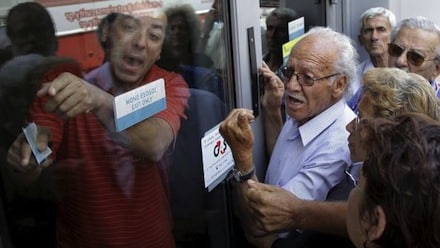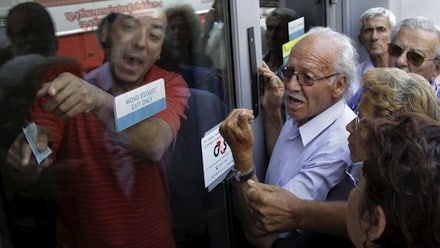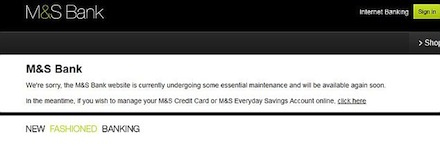
The photos from Greece showing long lines at ATMs are astonishing. Even after the deposit outflows from Greek banks over the past weeks, there are still large numbers of people who are trying to get their money out of the banking system. With the banks closed, ATMs are the only way for people to get any cash. Let’s not beat around the bush in describing what is happening: this is a bank run. Even though Greece has a deposit insurance scheme that covers up to €100,000 in savings accounts, trust in the banking sector is declining and people are trying to get their money out. Cash is the ultimate means by which consumers can restrain the behavior of governments and banks, which is why governments and banks are doing everything they can to do away with cash.
The problem with the banking system is that banks today operate as fractional reserve banks. Money deposited into savings accounts is loaned out up to the bank’s reserve requirement. If the reserve requirement is 10%, then 90% of the money in savings accounts is loaned out. If the reserve requirement is 3%, then 97% of the money in savings accounts is loaned out.
The problem comes about in that the bank simultaneously gives the full use of that money to borrowers, often lending at long terms up to 30 years in the case of mortgages, while still telling depositors that they can withdraw their money at any time. So what happens when depositors want to withdraw more money than the bank has on reserve? The bank tries to refuse to honor withdrawal requests. Then the public loses confidence in the bank, depositors line up to demand their money, and you have a scene out of “It’s a Wonderful Life.”
The banking system has come up with a number of methods to try to overcome this problem. Banks can borrow in overnight markets from other banks who have cash to spare; they can borrow from central banks at the discount window or similar lending facilities; and governments have instituted deposit insurance schemes to reassure bank depositors that even if the bank fails, they will still be able to get the entirety of the money in their savings deposits.
But despite all of these supposed safeguards, depositors in Greece still do not trust that their money is safe, and so Greece is experiencing a bank run. Depositors still have the ability to withdraw cash and they want to withdraw it right now. The risk is that if more cash is withdrawn than exists in bank reserves, the entire banking system could come crashing down. One bank unable to honor withdrawal requests is a problem; every bank unable to honor withdrawal requests is a crisis. That is why governments and banks would love to do away with cash and are doing everything in their power to move towards a cashless society. Sure, you could have an “electronic bank run” as in the case of Wachovia in 2008, but those are easier to stop.
How to stop an electronic bank run
Once a country’s system of money and banking is fully electronic, depositors are at the mercy of those who control bank websites and servers. Banks get back in the driver’s seat and depositors can no longer call the shots by lining up at ATMs to get physical cash. Undoubtedly central banks around the world are viewing what is happening in Greece with trepidation and doubling down on efforts to phase out the use of cash. While they view such steps as a means of strengthening the banking system by making it less susceptible to runs, the long-term effects will actually weaken the banking system. By further divorcing banks from the discipline imposed on them by depositors, banks will feel even more free to make risky loans and over-leverage themselves.
This is why efforts to usher in a cashless society must be strongly opposed. Consumers must be able to provide the ultimate check on banks, and not vice versa. A cashless society leaves citizens at the mercy of banks and governments. The excuses used to ban the use of cash are many: combating money laundering, fighting against terrorist financing, prohibiting the easy disposal of stolen goods, etc. Those are all just cover stories to convince people to hand over even more control to banks and governments. If you think that you should be in control of what happens to your money, oppose the War on Cash.
Reprinted with permission from the Carl Menger Center.


